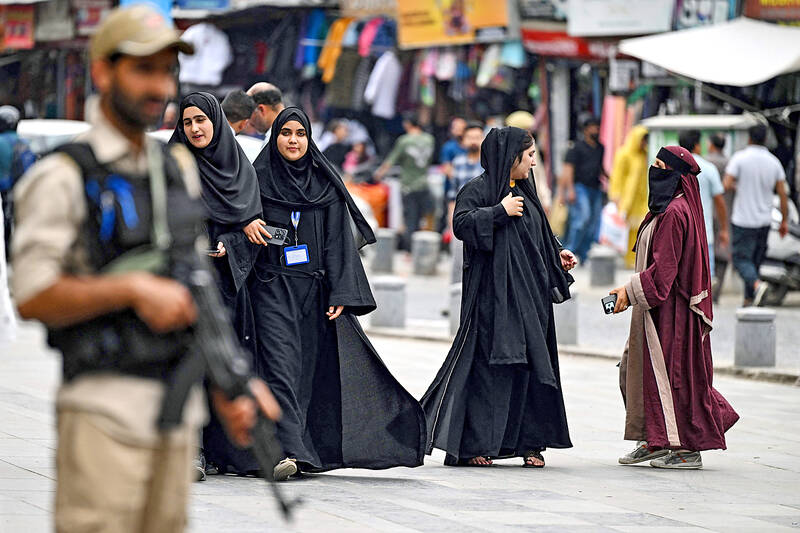The US has appealed to India and Pakistan to de-escalate after a deadly attack in Kashmir, as New Delhi yesterday said that both sides again traded border gunfire overnight.
India blames Pakistan for a gun attack that killed 26 people on Tuesday last week in Indian-administered Kashmir, with Indian Prime Minister Narendra Modi giving his military “complete operational freedom.”
Denying involvement, Islamabad says it has “credible evidence” that India is planning an imminent military strike, vowing that “any act of aggression will be met with a decisive response.”

Photo: AFP
US Secretary of State Marco Rubio on Wednesday separately called Indian Minister of External Affairs Subrahmanyam Jaishankar and Pakistani Prime Minister Shehbaz Sharif, the US Department of State said.
Rubio “urged Pakistani officials’ cooperation in investigating this unconscionable attack” and “encouraged India to work with Pakistan to de-escalate tensions and maintain peace and security in South Asia,” department spokeswoman Tammy Bruce said.
Jaishankar yesterday said after the call that the attack’s “perpetrators, backers and planners must be brought to justice.”
New Delhi reported the seventh straight night of small-arms gunfire between the two sides at the heavily militarized Line of Control, the de facto border.
Muslim-majority Kashmir, a region of about 15 million people, is divided between Pakistan and India, which have fought several wars over the disputed territory.
About 1.5 million people live near the ceasefire line on the Pakistani side, where residents were readying simple, mud-walled underground bunkers — reinforced with concrete if they could afford it.
“For one week we have been living in constant fear, particularly concerning the safety of our children,” said Iftikhar Ahmad Mir, a 44-year-old shopkeeper in Chakothi on the Line of Control. “We make sure they don’t roam around after finishing school and come straight home.”
Emergency services workers in Muzaffarabad, the main city in Pakistan-administered Kashmir, have also begun training schoolchildren on what to do if India attacks.
“We have learned how to dress a wounded person, how to carry someone on a stretcher and how to put out a fire,” 11-year-old Ali Raza said.

CROSS-STRAIT COLLABORATION: The new KMT chairwoman expressed interest in meeting the Chinese president from the start, but she’ll have to pay to get in Beijing allegedly agreed to let Chinese Nationalist Party (KMT) Chairwoman Cheng Li-wun (鄭麗文) meet with Chinese President Xi Jinping (習近平) around the Lunar New Year holiday next year on three conditions, including that the KMT block Taiwan’s arms purchases, a source said yesterday. Cheng has expressed interest in meeting Xi since she won the KMT’s chairmanship election in October. A source, speaking on condition of anonymity, said a consensus on a meeting was allegedly reached after two KMT vice chairmen visited China’s Taiwan Affairs Office Director Song Tao (宋濤) in China last month. Beijing allegedly gave the KMT three conditions it had to

STAYING ALERT: China this week deployed its largest maritime show of force to date in the region, prompting concern in Taipei and Tokyo, which Beijing has brushed off Deterring conflict over Taiwan is a priority, the White House said in its National Security Strategy published yesterday, which also called on Japan and South Korea to increase their defense spending to help protect the first island chain. Taiwan is strategically positioned between Northeast and Southeast Asia, and provides direct access to the second island chain, with one-third of global shipping passing through the South China Sea, the report said. Given the implications for the US economy, along with Taiwan’s dominance in semiconductors, “deterring a conflict over Taiwan, ideally by preserving military overmatch, is a priority,” it said. However, the strategy also reiterated

‘BALANCE OF POWER’: Hegseth said that the US did not want to ‘strangle’ China, but to ensure that none of Washington’s allies would be vulnerable to military aggression Washington has no intention of changing the “status quo” in the Taiwan Strait, US Secretary of Defense Pete Hegseth said on Saturday, adding that one of the US military’s main priorities is to deter China “through strength, not through confrontation.” Speaking at the annual Reagan National Defense Forum in Simi Valley, California, Hegseth outlined the US Department of Defense’s priorities under US President Donald Trump. “First, defending the US homeland and our hemisphere. Second, deterring China through strength, not confrontation. Third, increased burden sharing for us, allies and partners. And fourth, supercharging the US defense industrial base,” he said. US-China relations under

The Chien Feng IV (勁蜂, Mighty Hornet) loitering munition is on track to enter flight tests next month in connection with potential adoption by Taiwanese and US armed forces, a government source said yesterday. The kamikaze drone, which boasts a range of 1,000km, debuted at the Taipei Aerospace and Defense Technology Exhibition in September, the official said on condition of anonymity. The Chungshan Institute of Science and Technology and US-based Kratos Defense jointly developed the platform by leveraging the engine and airframe of the latter’s MQM-178 Firejet target drone, they said. The uncrewed aerial vehicle is designed to utilize an artificial intelligence computer